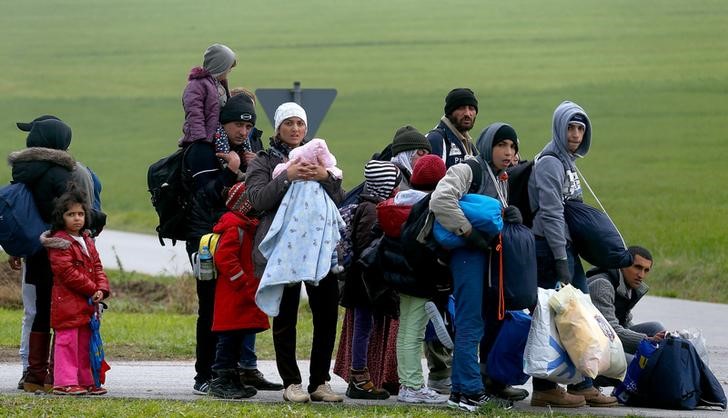By Paul Taylor
BRUSSELS (Reuters) - A rift over Europe's response to the sudden arrival of hundreds of thousands of refugees is leading some in Brussels to voice fears for the future of the European Union.
The 28-nation bloc is torn between solidarity and security as governments struggle to cope with an influx of people fleeing war and oppression in Syria, Afghanistan and the Horn of Africa, which is fuelling a political backlash in many countries.
"What was unimaginable before is possible today - that is the disintegration of the European project," Frans Timmermans, the European Commission vice-president coordinating EU action on the migration crisis, told the Friends of Europe think-tank.
Mutual mistrust among EU governments has reached alarming levels, say old Brussels hands who are used to frequent past crises.
While German Chancellor Angela Merkel is urging EU countries to open their doors and their hearts to refugees, other leaders see the top priorities as controlling the EU's external borders to stem arrivals, deporting more people denied asylum and paying third countries to keep refugees on their soil.
Several EU partners, led outspokenly by Hungarian Prime Minister Viktor Orban, accuse Merkel of having amplified the wave of migrants when she decided unilaterally in August to take in Syrian refugees without applying an EU rule that asylum seekers must apply in the first European country they reach.
German officials say she was simply recognising the reality that the asylum rules, which put an unrealistic burden on Greece and Italy, had broken down and required a humanitarian response.
A stampede of refugees heading to Germany across his country prompted Orban to seal Hungary's borders with Serbia and Croatia, setting off a chain reaction of beggar-thy-neighbour actions by overstretched governments.
That has stranded tens of thousands in inhuman conditions in the Western Balkans as winter nears.
Support for far-right parties fanning fears of foreigners, Islam and terrorism is soaring in France, Austria, Denmark, Sweden and the Netherlands. British Eurosceptics are using the crisis to buttress their arguments for voting to leave the EU in a forthcoming referendum.
Governments in central and eastern Europe are resisting demands from Berlin and Brussels to admit mandatory quotas of refugees. A swing to the nationalist right in Poland is likely to harden that front.
At home, Merkel faces growing pressure within her own conservative party to close German borders and limit the number of migrants. Her government has cut benefits for asylum seekers and is speeding up the removal of rejected applicants.
The crisis has also opened up divergences among EU institutions, with the European Commission under Jean-Claude Juncker treating it primarily as a long-term humanitarian challenge to integrate refugees.
By contrast, European Council President Donald Tusk, the former Polish prime minister who chairs EU summits, calls the wave of migrants a "threat" to be "stemmed" or "contained", notably by paying Turkey to keep Syrian refugees on its soil.
Tusk sided squarely with the security camp in a speech to centre-right leaders in Madrid last week, saying in a rare swipe at Merkel that those who want quotas for refugees to be agreed before Europe's borders were secured were naive.
"We can no longer allow solidarity to be equivalent to naivety, openness to be equivalent to helplessness, freedom to be equivalent to chaos. And by that, I am of course referring to the situation on our borders," he said.
"Citizens want to feel safe again, because only then will they be capable of helping people in need."
RICH AND WEAK
The influx poses profound challenges to ageing, wealthy but anxious European societies that were already struggling to adapt to globalisation and multi-culturalism.
It comes at a time when many working class voters have switched their support to the far right out of anger over unemployment, falling living standards and immigration.
While some European leaders portray the refugee wave as a temporary issue that can be curbed with better border controls, Timmermans said: "The worst thing we could do is to present the picture to people that if we take these measures, the problem will stop. It won't. It will be with us for a generation."
Even if there were a peace settlement in Syria's four-year-old civil war, which seems a remote prospect, the wider refugee and migration challenge will remain.
At the congress of the European People's Party, the dominant force among EU governments and the biggest party in the European Parliament, Orban drew applause when he denounced Merkel's open-door policy as a magnet for "economic migrants, refugees and also foreign fighters".
He depicted Europe as "rich and weak - the most dangerous possible mixture".
While many European leaders may deplore his strongarm tactics and rhetoric, they are acutely aware of the challenge the crisis poses to the their own political survival and to cooperation in the EU.

"The migration crisis will determine the future of our political family," Orban told delegates. "We are in a deep trouble. The migration crisis is able to destabilise governments, countries and the European continent."